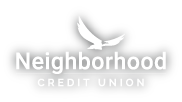Disaster Scams
Published February 24, 2021
The recent winter storm has impacted our members and their homes, including water damage and plumbing costs due to freezing temperatures. As a result, fraudsters may target our members and their families. A Fraud Analyst at Neighborhood Credit Union wants to share some tips with members to help them tackle repairs safely and to be aware of potential scams. In this, we will discuss steps to avoid post-disaster scams, door-to-door sales scams, price gouging, charity
scams, and who to contact if you suspect a scam.
Steps for Avoiding Post-Disaster Insurance Scams
If you get a phone call about an insurance claim or policy, don't give out any personal information or agree to any payment until you can independently verify that the call is legitimate. If the caller says they're from your insurance company, hang up and contact your agent or the company directly using the number on your account statement.
Contractors and home improvement companies may also call claiming to be partners with your insurance provider. Never give policy numbers, coverage details, or other personal information out to companies with whom you have not entered into a contract. If your state requires licensing, verify that any contractor you are considering is licensed and carries adequate insurance. Many states have online databases you can check.
Door-to-Door Sales
Be cautious when a salesperson appears at your door uninvited. Let it be known that not all door-to-door contractors are scammers, but many scammers do operate by going door to door.
Home improvement scams often flourish in the wake of emergencies, especially violent storms such as hurricanes and tornadoes. Beware of one-time offers—"available only today!"—or a special deal on materials left over from another job. If your home needs repairs, your best bet is to call a few home repair companies in your area and then check their references.
Price Gouging
When an emergency takes place, some businesses may raise their prices excessively on essential goods and services like drinking water, housing, food, and fuel. Charging excessive prices for necessities when an emergency has been declared by the governor is considered price gouging.
Under the Texas Deceptive Trade Practices Act, price gouging is illegal, and the Office of the Attorney General has the authority to prosecute any business that engages in price gouging after an emergency has been declared by the governor. If you feel that you are being unfairly charged for goods or services after an emergency for a necessity, raise the issue of price gouging with the provider.
Disaster Relief Charity Scams
Consumers should also be aware of scammers posing as representatives of charities seeking donations for disaster relief. There are several steps you can take to protect yourself from this type of fraud:
- Donate to trusted, well-known charities. Beware of scammers who create fake charities during natural disasters. Always verify a charity's legitimacy through its official website. If you have doubts, you can check with Better Business Bureau's Wise Giving Alliance, Charity Navigator, Charity Watch, or GuideStar. You can also check with the National Association of State Charity Officials whether charities must be registered in your state and if the charity contacting you is on file with your state.
- Verify all phone numbers for charities. If you need to contact a charity by phone, check the charity's official website to see if the number you have is legitimate. If you're using text-to-donate, check with the charity to ensure the number is legitimate before donating.
- Do not open suspicious emails. If you receive a suspicious email requesting donations or other assistance, do not click on any links or open any attachments. Scammers regularly use email for phishing attacks and to spread malware.
- Verify information in social media posts. Double-check any solicitation for charitable donations before you give. Crowd-funding websites often host individual requests for help but they are not always vetted by the site or other sources.
Neighborhood Credit Union want to support and protect our members the best we can. If you are facing hardship and need help, please reach out to see if we can assist you with your financial needs by messaging us on our website at myncu.com.
If you would like to further your reading on Post-Disaster scams, here are some additional articles with more information:
If you would like to further your reading on Post-Disaster scams, here are some additional articles with more information:
Texas Attorney General: How to Avoid Home Improvement Scams
Federal Communications Commission: After Storms, Watch Out for Scams
Federal Communications Commission: After Storms, Watch Out for Scams


This blog was contributed by a Neighborhood Credit Union Fraud Analyst.
Who We Are
As an active part of the community for 92 years, Neighborhood Credit Union is a not-for-profit financial organization serving the state of Texas with branch locations in Collin, Dallas, Denton, Ellis, and Tarrant counties. With assets topping $1 billion, Neighborhood Credit Union has a continuously growing membership of over 60,000. For more information, call (214) 748-9393 or visit our homepage.

